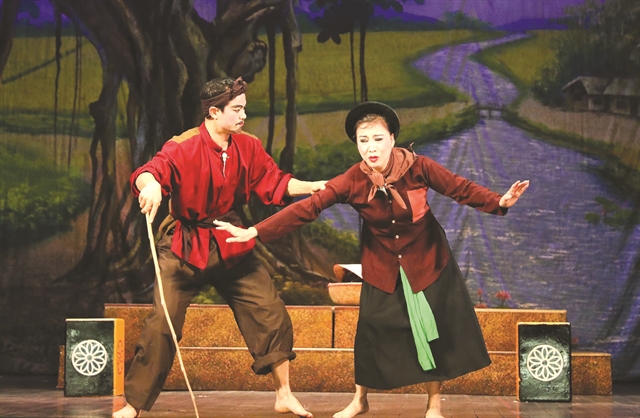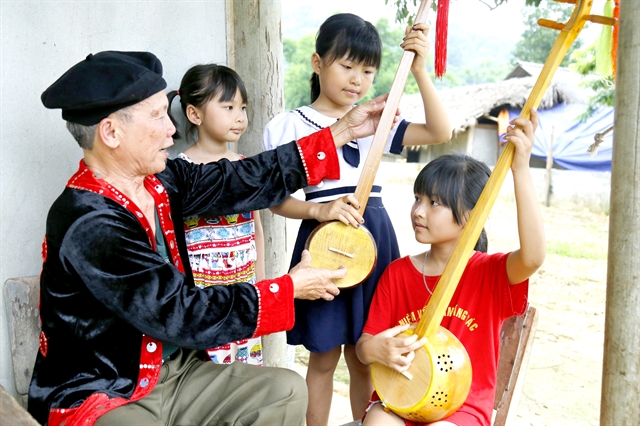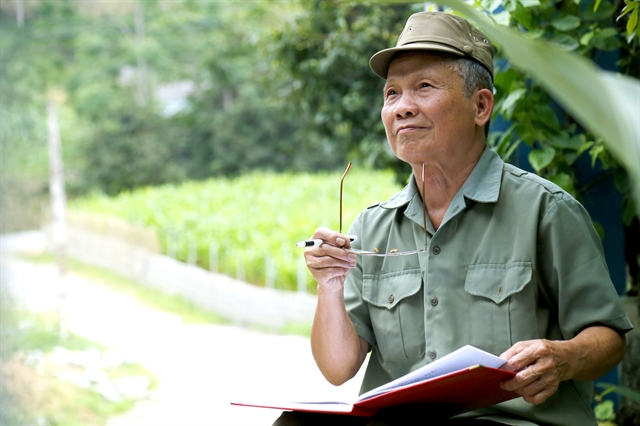 Features
Features

Lương Xuân Dán, a veteran from the Tày ethnic minority group in Đức Uy Village, Yên Sơn District in northern mountainous Tuyên Quang Province, has an endless passion for folk music. His love, devotion, and experience playing the music have now inspired local people to become involved in preserving the musical artform.

|
Lương Xuân Dán, a veteran of the Tày ethnic group in Yên Sơn District in northern mountainous province of Tuyên Quang, has an endless passion for local folk music.
His love, devotion, and experience playing the music have now permeated throughout his native Đức Uy Village, Trung Sơn Commune, inspiring local people, especially the younger generation, to become involved in preserving the musical form.
Dán, 73, fought in the resistance war against the Americans, in the 1970s, driving combat vehicles with Division Group 559 of the Việt Nam People’s Army in the battlefields near Laos.
Despite the hardships and danger, he sang folk songs whenever he could, easing the weariness in the legs of his fellow soldiers as they marched. His enthusiasm helped relieve the burden of war they all bore and encouraged them to be brave when danger came.
His singing was said to “drown out the bomb explosion”.
Not only did he sing well, Dán was always ready to learn about other types of folk music whenever he had the chance.
“When an art troupe would come to entertain the soldiers, I would make sure I met them and tried to learn their songs and their different instruments,” he remembered.
He could not only sing many folk songs, particularly then - an essential part of the spiritual lives of ethnic groups in northern Việt Nam and an intangible cultural heritage of humanity recognised by UNESCO - but also play 15 different traditional musical instruments.
Among his playing repertoire were also the đàn nhị (a two-string fiddle), the đàn tam (a three-string banjo), the đàn tứ (a four-string banjo), the đàn bầu (a monochord), and the flute.
Dán was wounded several times on the battlefield, and eventually returned to the rear. In 1974 he worked as a driver for Tuyên Quang Food Company.

|
He underwent five surgeries during his soldiering days and more than 30 pieces of shrapnel remain in his body, which made him a war invalid. Pain is a constant companion, especially when the weather changes and aches and tiredness set in.
His love for music, however, remains unbowed.
“Music not only helps lessen the pain but also gives my life meaning,” he said.
The villager has composed songs and poems of some renown, including Chào thành phố Tuyên Quang (Hello Tuyên Quang City), Uống nước nhớ nguồn (When Drinking Water, Remember its Source), and Quê em ơn Đảng, Bác Hồ (Homeland Grateful to the Party and Uncle Hồ).
The song Khúc hát người chiến sĩ thu mua, about logistic soldiers, won him a silver medal when he played it at a national arts show in 1985 held by the then ministry of home trade in northern central Nghệ An Province.
He and his art troupe in Trung Sơn Commune have won many prizes at provincial cultural festivals held annually to boost cultural exchanges between different parts of Tuyên Quang.

|
The veteran and his wife are now in their twilight years and life is something of a struggle. They live in a small house and earn money from a 1.5- hectare farm where they grow pomelos and lychees, and raise poultry.
Despite the hardships, he maintains the strong spirit of "a soldier of Uncle Hồ", and leads the way in taking on different tasks and jobs, such as policeman and deputy head of the village.
He is currently president of the Trường Sơn ATK Veterans Association, chairman of the Trung Sơn Communal Elderly Club and member of the Việt Nam Poetry Club.
National awards came his way, including a Glorious Soldier Order and a Resistance War Order, in recognition of his contribution to the anti-American war.
For many years he has found great pleasure in passing on his love of traditional music to the younger generation in the commune, holding free classes at his home for small groups of those who love music.
His students now count around 20 and, health-permitting, Dán’s greatest wish is that he continues to preserve and pass on his knowledge and love of folk music to young people.
Triệu Văn Xiên, chairman of the Trung Sơn Veterans Association, praised Dán as a shining example of a veteran and an elder in the commune.
“He is always enthusiastic and takes responsibility for any task assigned him by the association,” Xiên said. “His abilities in folk music and culture in general add to the spiritual lives of all our members.”
Members also appreciate Dán’s initiative in opening music classes at his home to raise awareness about the preservation of the ethnic music.
Xiên stands fully behind Dán’s efforts to encourage all families of the Tày group in the commune to send their children and grandchildren to his classes, which have already done so much to preserve the unique folk music and boost the profile of local minorities. VNS




